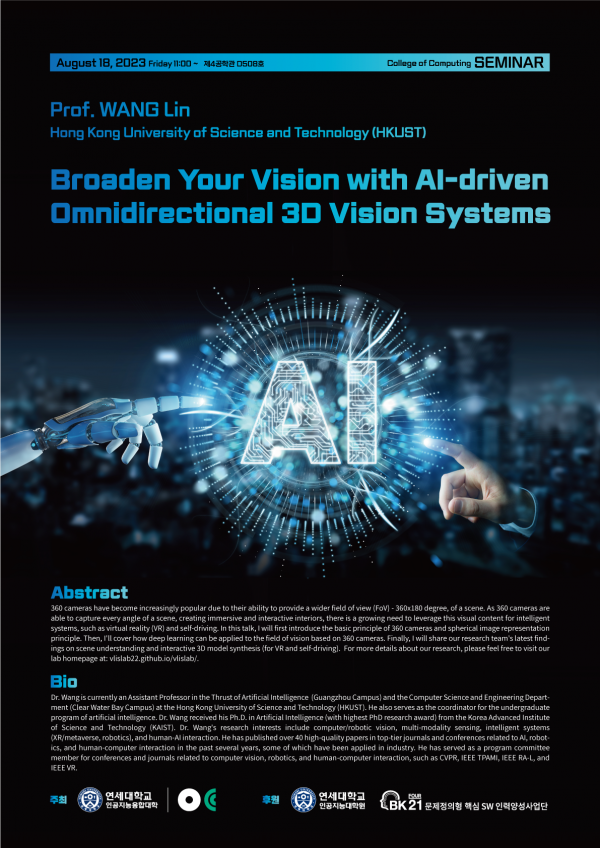[세미나] Prof. Lin WANG (HKUST) (8/18(금))
페이지 정보
작성자 최고관리자 댓글 조회 작성일 23-08-09 11:33본문
2023년 8월 18일(금) 11:00~
제4공학관 D508호
Broaden Your Vision with AI-driven Omnidirectional 3D Vision Systems
Abstract
360 cameras have become increasingly popular due to their ability to provide a wider field of view (FoV) - 360x180 degree, of a scene. As 360 cameras are able to capture every angle of a scene, creating immersive and interactive interiors, there is a growing need to leverage this visual content for intelligent systems, such as virtual reality (VR) and self-driving. In this talk, I will first introduce the basic principle of 360 cameras and spherical image representation principle. Then, I'll cover how deep learning can be applied to the field of vision based on 360 cameras. Finally, I will share our research team's latest findings on scene understanding and interactive 3D model synthesis (for VR and self-driving). For more details about our research, please feel free to visit our lab homepage at: vlislab22.github.io/vlislab/.
Bio
Dr. Wang is currently an Assistant Professor in the Thrust of Artificial Intelligence (Guangzhou Campus) and the Computer Science and Engineering Department (Clear Water Bay Campus) at the Hong Kong University of Science and Technology (HKUST). He also serves as the coordinator for the undergraduate program of artificial intelligence. Dr. Wang received his Ph.D. in Artificial Intelligence (with highest PhD research award) from the Korea Advanced Institute of Science and Technology (KAIST). Dr. Wang's research interests include computer/robotic vision, multi-modality sensing, intelligent systems (XR/metaverse, robotics), and human-AI interaction. He has published over 40 high-quality papers in top-tier journals and conferences related to AI, robotics, and human-computer interaction in the past several years, some of which have been applied in industry. He has served as a program committee member for conferences and journals related to computer vision, robotics, and human-computer interaction, such as CVPR, IEEE TPAMI, IEEE RA-L, and IEEE VR.
- 이전글[SW중심대학] 2023 인공지능대학원 심포지엄 홍보 23.08.10
- 다음글[미래교육원 X 코드프레소] 웹 백엔드 실무 개발 프로젝트 (8/23(수) 오후 5시까지 접수) 23.08.02
댓글목록
등록된 댓글이 없습니다.



